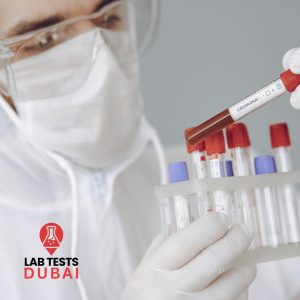
Accurate Treponema Pallidum Haemagglutination Detection (TPHA)
160,00 د.إ
The Treponema pallidum haemagglutination test (TPHA) is a highly specific and sensitive serological assay for detecting antibodies against Treponema pallidum, the causative agent of syphilis. It is widely used for confirmatory diagnosis following initial screening tests. The TPHA test is based on passive haemagglutination, where sensitized erythrocytes agglutinate in the presence of specific antibodies, providing a clear, visual result.
Sample Type : Serum
Methodology : Microhaemagglutination
TAT : 1 Day
Description
Treponema Pallidum Haemagglutination Test (TPHA) – Accurate Syphilis Confirmation
The Treponema Pallidum Haemagglutination Test (TPHA) from Lab Tests Dubai is a highly specific confirmatory blood test that detects antibodies against Treponema pallidum—the bacterium that causes syphilis, a serious but treatable sexually transmitted infection (STI).
While initial syphilis screening (e.g., RPR or VDRL) is non-treponemal and can give false positives, the TPHA test is treponemal—meaning it directly targets the bacteria, making it 99% specific for confirming active or past syphilis infection.
This test is essential for:
- Confirming a positive RPR/VDRL result
- Diagnosing latent or late-stage syphilis
- Screening pregnant women after initial positive screening
- Evaluating neurological symptoms (e.g., vision changes, dementia)
- Pre-marital or pre-employment health checks in high-risk regions
Using microhaemagglutination methodology, this serum-based test delivers accurate results within just 1 day, helping infectious disease specialists and OB-GYNs confirm syphilis and initiate life-saving treatment.
Available with home blood collection, Lab Tests Dubai ensures fast, accurate, and confidential testing—so you can get definitive answers without delay.
Why You Need This Test
If you’ve had a positive syphilis screening (RPR/VDRL) or are at risk of exposure, this test could confirm whether you have syphilis—so you can start treatment and prevent complications.
You need the TPHA Test if:
- You had a positive RPR or VDRL test
- You’re pregnant and tested positive on routine syphilis screening
- You have painless genital sores (chancres) or rash on palms/soles
- You’ve had unprotected sex with a new or unknown partner
- You’re being evaluated for neurological or cardiovascular symptoms
- You’re undergoing pre-marital, visa, or employment health screening
This test helps:
- Confirm true syphilis infection (vs. false-positive RPR)
- Guide antibiotic treatment (penicillin is highly effective)
- Prevent transmission to partners or unborn babies
- Avoid misdiagnosis from conditions like lupus or hepatitis
Early confirmation = faster treatment and better outcomes.
Symptoms That Indicate This Test
Consider the TPHA Test if you experience:
✅ For Primary Syphilis:
- Painless genital, anal, or oral ulcer (chancre)
- Swollen lymph nodes near the sore
✅ For Secondary Syphilis:
- Red or scaly rash (palms, soles, body)
- Fever, fatigue, sore throat
- Patchy hair loss
- Wart-like lesions (condylomata lata)
✅ For Latent or Late Syphilis:
- No symptoms (latent stage)
- Neurological issues (vision loss, dementia, stroke)
- Cardiovascular problems (aortic aneurysm)
✅ For High-Risk Individuals:
- Unprotected sex or multiple partners
- MSM (Men who have sex with men)
- HIV-positive individuals
- Pregnant women with positive screening
Many people are asymptomatic—making screening and confirmation critical.
Natural Production: How TPHA Detects Syphilis Antibodies
After infection with Treponema pallidum:
- The immune system produces specific IgG and IgM antibodies against treponemal antigens
- These antibodies persist for life, even after successful treatment
- The TPHA test detects these antibodies using red blood cells coated with T. pallidum antigens—if antibodies are present, they cause visible clumping (haemagglutination)
Key Facts:
- TPHA is a confirmatory test—not used alone for screening
- Positive TPHA + Positive RPR → Active or past infection
- Positive TPHA + Negative RPR → Treated or latent syphilis
- Never clears—once positive, usually stays positive for life
This test is part of the “Reverse Algorithm” used in modern syphilis testing.
What Happens If Untreated? Risks of Ignoring Syphilis
Ignoring syphilis can lead to:
⚠️ Neurosyphilis – dementia, blindness, paralysis
⚠️ Cardiovascular Syphilis – aortic aneurysm, valve damage
⚠️ Congenital Syphilis – stillbirth, deformities, blindness in newborns
⚠️ Increased HIV Risk – open sores increase transmission
⚠️ Irreversible Organ Damage – in late stages
The good news? Syphilis is 100% treatable with:
- Benzathine penicillin G (single or multiple doses)
- Alternative antibiotics (for penicillin-allergic patients)
- Partner notification and treatment
Early confirmation = complete cure and prevention of complications.
How to Prepare for the Test
To ensure accurate results:
✅ No fasting required
✅ Continue your regular medications—but inform your doctor
✅ Inform your doctor of:
- Previous syphilis diagnosis or treatment
- Recent STI screenings
- Current symptoms or exposures
A serum blood sample is collected via standard draw—available at our labs or via home collection.
Test Overview: Microhaemagglutination Method
Interpretation:
- Negative → No evidence of syphilis infection
- Positive → Confirms exposure to T. pallidum (past or present)
- Titer reported (e.g., 1:80, 1:320) – higher titers suggest active infection
Note: Always interpret with RPR/VDRL results and clinical history.
Benefits of the TPHA Blood Test
🔹 High Specificity
Confirm syphilis with 99% accuracy.
🔹 Critical for Pregnancy
Prevent congenital syphilis with timely treatment.
🔹 Prevent Misdiagnosis
Rule out false positives from RPR/VDRL.
🔹 Guide Treatment
Support penicillin therapy decisions.
🔹 Peace of Mind
Know your status with a gold-standard test.
If you’ve had a positive syphilis screening or are at risk, the TPHA Test gives you the definitive answers you need in just 1 day.




Reviews
There are no reviews yet.